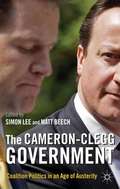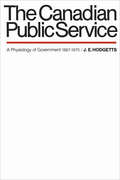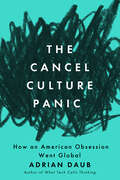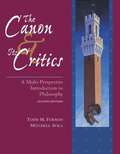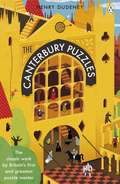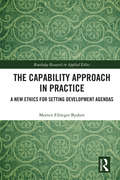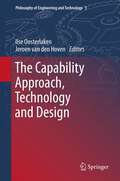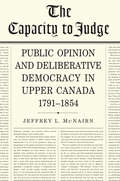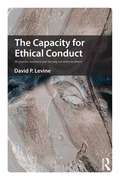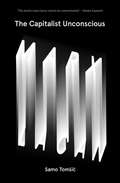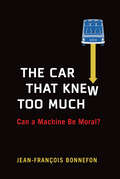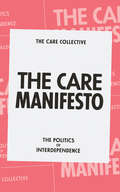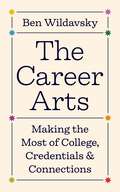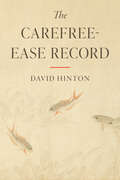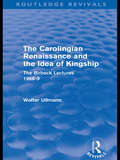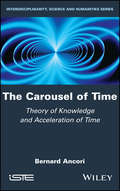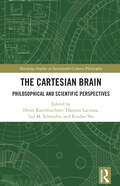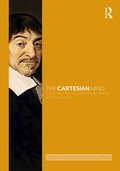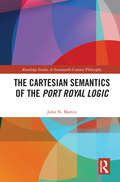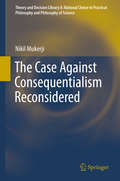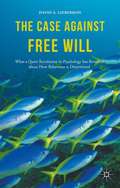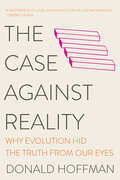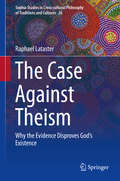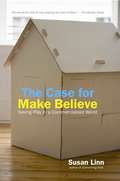- Table View
- List View
The Cameron–Clegg Government
by Simon Lee Matt BeechBeech and Lee provide a definitive guide to the coalition's first year in office. Offering compelling insights into their policy agenda, its chances of success, and a thought-provoking analysis of how the coalition government will affect the Conservatives, Liberal Democrats and Labour long-term.
The Canadian Public Service: A Physiology of Government 1867-1970
by John HodgettsThe Canadian Public Service is now so large that it employs over ten per cent of Canada's labour force, and among its many boards, commissions, and corporations there is a constant juggling of conventional departmental portfolios in an effort to keep pace with changing public priorities. As these bureaucracies penetrate our lives more and more, there is increasing need for a study which describes and explains them. This book is the first to offer the necessary clarification. It says nothing about public servants themselves; rather it focuses on the physiognomy and physiology of the structures in which they work and through which programmes are allocated, work distributed, and policy decisions made for all of Canada. It also examines the way in which environmental forces have helped to shape our so-called administrative culture, as well as the monumental difficulties that are involved in co-ordinating the administration of this vast country, three-quarters of whose public service concerns are located outside the capital. It concludes that all of our public organizations, the public service has proven the most responsive to the forces of change, but that it has been so caught up in structural and managerial adaptation that its capacity to concern itself with substantive policy issues has been subverted.
The Cancel Culture Panic: How an American Obsession Went Global
by Adrian DaubFear of cancel culture has gripped the world, and it turns out to be an old fear in a new get-up. In this incisive new work, Adrian Daub analyzes the global spread of cancel culture discourse as a moral panic, showing that, though its object is fuzzy, talk of cancel culture in global media has become a preoccupation of an embattled liberalism. There are plenty of conservative voices who gin up worries about cancel culture to advance their agendas. But more remarkable perhaps is that it is centrist, even left-leaning, media that have taken up the rallying cry and really defined the outlines of what cancel culture is supposed to be. Media in Western Europe, South America, Russia, and Australia have devoted as much—in some cases more—attention to this supposedly American phenomenon than most US outlets. From French crusades against "le wokisme" via British fables of the "loony left" to a German obsession with campus anecdotes to a global revolt against "gender studies": countries the world over have developed culture war narratives in conflict with the US, and, above all, its universities—narratives that they themselves borrowed from the US. Who exactly is afraid of cancel culture? To trace how various global publics have been so quickly convinced that cancel culture exists and that it poses an existential problem, Daub compares the cancel culture panic to moral panics past, investigating the powerful hold that the idea of "being cancelled" has on readers around the world. A book for anyone wondering how institutions of higher learning in the US have become objects of immense interest and political lightning rods; not just for audiences and voters in the US, but worldwide.
The Canon And Its Critics: A Multi-Perspective Introduction to Philosophy
by Todd M. Furman Mitchell AvilaIn our experience, philosophical discourse in the past two decades has been marked by unprecedented vibrant energy, vigorous debate, and engaging new developments. Whether the result of ongoing developments within the traditional confines of academic philosophy, or the consequence of critiques and challenges by individuals formerly marginalized from mainstream philosophy, or the fruit of cross-fertilization from interdisciplinary ventures, philosophers have witnessed unparalleled advances resulting in the production of interesting new philosophies. In the past decade, a very different picture of the boundaries and frontiers of philosophy has emerged. A new textbook was necessary in order to respond to these changes.
The Canterbury Puzzles
by Henry DudeneyFor the mastermind who has what it takes to solve the tricky conundrums from Britain's first and greatest puzzle master.---------------------------------------Solve the puzzle of The Mystery of Ravensdene Park . . . trace the route of the butler, the gamekeeper and the two anonymous guests and the key to the mystery will reveal itself.---------------------------------------Decipher the riddle of The Frogs' Ring for The Merry Monks of Riddlewell . . . ---------------------------------------At The Squire's Christmas Puzzle Party ascertain just how many kisses had been given Under the Mistletoe Bough . . . ---------------------------------------First published in 1907, Dudeney's The Canterbury Puzzles is a classic of the genre, based on characters from Chaucer's Tales. The book contains 114 puzzles suitable for young enthusiasts, recreational mathematicians and veteran puzzlers alike. As challenging today as it was over a century ago, this ingenious book will provide hours-worth of puzzles to keep your brain alert."Regular exercise is supposed to be as necessary for the brain as for the body. Many of us are very apt to suffer from mental cobwebs, and there is nothing equal to the solving of puzzles for sweeping them away." - Henry Dudeney (1847-1930)
The Capability Approach in Practice: A New Ethics in Setting Development Agendas (Routledge Research in Applied Ethics)
by Morten Fibieger ByskovThis book develops a philosophical framework for selecting goals for development purposes. This inclusive and democratic framework integrates a variety of resources including philosophical theory, empirical analysis, stakeholder deliberations, local knowledge, and advice from development experts. The author contends that we must provide good reasons and arguments in order to justify a particular development agenda. That is, we need to ask why we choose certain kinds of development goals over others, why we include certain agents in the selection process and not others, and why we select goals through one method rather than another. In response to these questions, the author argues that development should aim at expanding people’s capabilities and functionings. Capabilities and functionings—capabilities that have been realized—tell us what people are actually able to do and be with their resources, goods, and formal freedoms. He advances the view that local stakeholders should have more authority in deciding what a development agenda looks like. This claim to local authority in development can be interpreted both as a claim to political authority and expert authority. Finally, the author argues that ad hoc, foundational, procedural, and mixed (multi-stage) methods need to be synthesized in order to select the best capabilities and functionings for development. The Capability Approach in Practice provides a philosophical and systematic approach to setting development agendas. It is an important contribution to the literature on the capability approach and development ethics, which will appeal to a broad range of scholars within philosophy and development studies.
The Capability Approach, Technology and Design
by Jeroen Van Hoven Ilse OosterlakenThe capability approach of Martha Nussbaum and Amartya Sen places human capabilities at the centre stage of discussions about justice, equality, development and the quality of life. It rejects too much emphasis on mere preference satisfaction or resource provision and highlights the importance of human agency and freedom. This approach has already significantly influenced different fields of application, such as economics and development studies. Only recently have scholars started to explore its relevance for and application to the area of technology and design, which can be crucial factors in the expansion of human capabilities. How does technology influence human capabilities? What difference could a capability approach make to policies and practices of applying ICT in development processes in the South? How can we criticize and improve the design of technology from the perspective of the capability approach? The authors of this volume explore the implications of the capability approach for technology & design and together create the first volume on this emerging topic.
The Capacity To Judge: Public Opinion and Deliberative Democracy in Upper Canada,1791-1854
by Jeffrey McnairnBy the mid-nineteenth-century, 'public opinion' emerged as a new form of authority in Upper Canada. Contemporaries came to believe that the best answer to common questions arose from deliberation among private individuals. Older conceptions of government, sociability and the relationship between knowledge and power were jettisoned for a new image of Upper Canada as a deliberative democracy. The Capacity to Judge asks what made widespread public debate about common issues possible; why it came to be seen as desirable, even essential; and how it was integrated into Upper Canada's constitutional and social self-image. Drawing on an international body of literature indebted to Jürgen Habermas and based on extensive research in period newspapers, Jeffrey L. McNairn argues that voluntary associations and the press created a reading public capable of reasoning on matters of state, and that the dynamics of political conflict invested that public with final authority. He traces how contemporaries grappled with the consequences as they scrutinized parliamentary, republican and radical options for institutionalizing public opinion. The Capacity to Judge concludes with a case study of deliberative democracy in action that serves as a sustained defense of the type of intellectual history the book as a whole exemplifies.
The Capacity for Ethical Conduct: On psychic existence and the way we relate to others
by David P. LevineWhat is the root cause of ethical failure? Why is preoccupation with ethics more a part of the problem than a part of the solution? What makes ethical conduct a natural expression of who we are? What enables us to be ourselves in our relations with others? Ethical failure has become a significant concern in public life, in organizations and in educational institutions. The Capacity for Ethical Conduct explores how qualities of character and personality either make ethical conduct possible for the individual or foster ethical failure. David Levine discusses how ethical conduct is a special way of relating to others, one that secures respect for their integrity by assuring that what they do can express who they are. He argues that this special way of relating to others results not from knowledge of, or a stated commitment to, rules, norms and values, but from the way we experience ourselves, especially from our ability to make a positive emotional investment in being and having a self. Traditionally, emphasis on the importance of values and ethics in shaping conduct tends to be connected to the need to find fault in self and others, fostering an atmosphere where the self is put at risk in its relations to others. This means that an excessive emphasis on ethics, rather than assuring ethical conduct, tends instead to create interpersonal settings marked by emotional assault. Because of this, talk about ethics often expresses ambivalence about ethical conduct, which makes the familiar combination of preoccupation with ethics and ethical failure unsurprising. The Capacity for Ethical Conduct explores the ways in which the interpersonal world of work either fosters a feeling of safety or encourages various forms of emotional assault. Presenting case studes and applying psychoanalytic object relation theory and self psychology, this book explores the factors underlying ethical failure and the capacity for ethical conduct. It will be of interest to scholars and practioners in the fields of psychoanalysis, psychology, philosophy, sociology, organizational dynamics, management and public administration.
The Capitalist Unconscious
by Samo TomsicA major systematic study of the connection between Marx and Lacan's workDespite a resurgence of interest in Lacanian psychoanalysis, particularly in terms of the light it casts on capitalist ideology--as witnessed by the work of Slavoj i ek--there remain remarkably few systematic accounts of the role of Marx in Lacan's work. A major, comprehensive study of the connection between their work, The Capitalist Unconscious resituates Marx in the broader context of Lacan's teaching and insists on the capacity of psychoanalysis to reaffirm dialectical and materialist thought. Lacan's unorthodox reading of Marx refigured such crucial concepts as alienation, jouissance and the Freudian 'labour theory of the unconscious'. Tracing these developments, Tomšič maintains that psychoanalysis, structuralism and the critique of political economy participate in the same movement of thought; his book shows how to follow this movement through to some of its most important conclusions.From the Trade Paperback edition.
The Car That Knew Too Much: Can a Machine Be Moral?
by Jean-Francois BonnefonThe inside story of the groundbreaking experiment that captured what people think about the life-and-death dilemmas posed by driverless cars.Human drivers don't find themselves facing such moral dilemmas as "should I sacrifice myself by driving off a cliff if that could save the life of a little girl on the road?" Human brains aren't fast enough to make that kind of calculation; the car is over the cliff in a nanosecond. A self-driving car, on the other hand, can compute fast enough to make such a decision--to do whatever humans have programmed it to do. But what should that be? This book investigates how people want driverless cars to decide matters of life and death. In The Car That Knew Too Much, psychologist Jean-François Bonnefon reports on a groundbreaking experiment that captured what people think cars should do in situations where not everyone can be saved. Sacrifice the passengers for pedestrians? Save children rather than adults? Kill one person so many can live? Bonnefon and his collaborators Iyad Rahwan and Azim Shariff designed the largest experiment in moral psychology ever: the Moral Machine, an interactive website that has allowed people --eventually, millions of them, from 233 countries and territories--to make choices within detailed accident scenarios. Bonnefon discusses the responses (reporting, among other things, that babies, children, and pregnant women were most likely to be saved), the media frenzy over news of the experiment, and scholarly responses to it. Boosters for driverless cars argue that they will be in fewer accidents than human-driven cars. It's up to humans to decide how many fatal accidents we will allow these cars to have.
The Care Manifesto: The Politics of Interdependence
by The Care CollectiveWe are in the midst of a global crisis of care. How do we get out of it?The Care Manifesto puts care at the heart of the debates of our current crisis: from intimate care--childcare, healthcare, elder care--to care for the natural world. We live in a world where carelessness reigns, but it does not have to be this way.The Care Manifesto puts forth a vision for a truly caring world. The authors want to reimagine the role of care in our everyday lives, making it the organising principle in every dimension and at every scale of life. We are all dependent on each other, and only by nurturing these interdependencies can we cultivate a world in which each and every one of us can not only live but thrive.The Care Manifesto demands that we must put care at the heart of the state and the economy. A caring government must promote collective joy, not the satisfaction of individual desire. This means the transformation of how we organise work through co-operatives, localism and nationalisation. It proposes the expansion of our understanding of kinship for a more 'promiscuous care'. It calls for caring places through the reclamation of public space, to make a more convivial city. It sets out an agenda for the environment, most urgent of all, putting care at the centre of our relationship to the natural world.
The Career Arts: Making the Most of College, Credentials, and Connections
by Ben WildavskyA persuasive case for building career success through broad education, targeted skills, and social capitalYoung people coming out of high school today can expect to hold many jobs over the course of their lives, which is why they need a range of essential skills. The Career Arts provides a corrective to the widespread and misleading notion that there is a direct trade-off between going to college and acquiring practical job skills. Ben Wildavsky cuts through the noise and anxiety surrounding this issue to offer sensible, clear-eyed guidance for anyone who is making decisions about education and career preparation with a view to getting ahead in the workforce.Drawing on evidence-based research, illuminating case studies, and in-depth interviews, Wildavsky shares the most vital lessons of what he calls the career arts, which include cultivating a mix of broad and targeted skills, taking advantage of employer-funded education benefits, and preparing for the world as it is, not as you wish it could be. He explains why college remains the gold standard of credentials, and presents the most promising high-quality supplements and alternatives to college that can help learners combine general and job-specific skills. He shows how building social capital is also critical to success, particularly for disadvantaged students.An invaluable guidebook for students, parents, counselors, and educators, The Career Arts reveals why college education and job preparation are not either-or propositions and identifies the blend of education and networking needed to support real-world career aspirations.
The Carefree-Ease Record
by David HintonIn this radical new translation of a classic Ch&’an (Zen) koan collection, David Hinton illuminates the Taoist dimensions of &“carefree-ease,&” the effortless joy of the enlightened mind in harmony with earth and cosmos.First collected by the Ch&’an master Wisdom-Expanse (Hung-Chih) in the twelfth century, this collection of one hundred kung-ans, or koans, is an essential text for students of Ch&’an and Zen. These miniature masterpieces of Chinese philosophy and literature offer a unique way of penetrating directly into the essence of Ch&’an teaching, and in this new translation, Hinton affords readers an opportunity to experience these koans in English like never before. Paring away the later commentaries that are usually presented with these koans, Hinton lets the original stories stand on their own, revealing themselves as nothing less than poetic expressions of the awakened mind. A far cry from the transcendence of life-and-death that typifies the traditional Buddhist goal of nirvana, this awakening is distinctly earthy and grounded in the rhythms of nature, shaped by the centuries of Taoist tradition that preceded Ch&’an. &“Carefree ease,&” writes Hinton, &“is to move through life with the profound tranquility of the Cosmos itself as it unfurls through its perennial transformations.&”Following his translation of No-Gate Gateway (2018) and Blue-Cliff Record (2024), this volume marks the completion of Hinton&’s project to translate all three of the classic koan collections.
The Carolingian Renaissance and the Idea of Kingship: The Birkbeck Lectures, 1968-9 (Routledge Revivals: Walter Ullmann on Medieval Political Theory)
by Walter UllmannIn his Birkbeck Lectures, first published in 1969, Professor Ullmann throws new light on a familiar subject. He shows that the Carolingian renaissance had a wider and deeper meaning than has often been thought, especially in its political and ideological aspects. Displaying his mastery of both primary and secondary sources, Professor Ullmann presents an integrated history. He shows an epoch which holds a key to the better understanding not only of the subsequent medieval centuries, but also of modern Europe. This book opened new vistas in political, ideological and social history as well as in historical theology and jurisprudence and showed how relevant knowledge of the past is for the understanding of the present.
The Carousel of Time: Theory of Knowledge and Acceleration of Time
by Bernard AncoriBased around the image of a carousel, this book uses epistemological theory to tackle the paradoxical acceleration and deceleration of time that is experienced by many. The consequence of this paradox is the observance of the past, present and future coinciding, where acceleration is combined with perfect immobility. The Carousel of Time proposes a model that focuses on a complex network of individual actors, and their relation to the analysis, structure and evolution of our socio-cognitive space–time. The first part of the book, "Foundations", presents the key bases of this model, as well as the notions that must be understood and integrated. The book then analyzes the concept of "Space", defining the parameters of the network’s boundaries, and finishes with an exploration of "Time". This third part links the temporality of the network to its spatial characteristics and studies its evolution.
The Cartesian Brain: Philosophical and Scientific Perspectives (Routledge Studies in Seventeenth-Century Philosophy)
by Tad M. Schmaltz Denis Kambouchner Damien Lacroux Ruidan SheThis volume presents new research on Cartesian psychophysiology that combines historical and textual analysis with a consideration of recent advances in contemporary neuroscience research. It seeks to explain why the Cartesian theory of the brain and its communication with the mind still offer a remarkable model for cognitive studies.New research in the philosophy of mind and cognitive science has reignited interest in the role and the structure of the "Cartesian brain" among scholars of Descartes. This volume rethinks Cartesian psychology from the perspective of physiology, with the aim of redetermining the contributions of the brain and central nervous system to mental phenomena. The first part of the volume concerns the details of Descartes’s own physiological account of the brain. The discussion covers his treatment not only of the anatomy of the brain but also of the mode of interaction between mind and body, in which the pineal gland plays a central role, and of the relation between the brain and the rest of the body. The second part considers the reception and legacy of the Cartesian brain. The focus here is on understanding how Cartesian psychophysiology was received by Descartes’s early modern contemporaries and immediate successors, as well as on the relevance of the Cartesian brain for contemporary neurophysiology and cognitive science.The Cartesian Brain is an essential resource for scholars and advanced students interested in Descartes, history of philosophy, history of science, philosophy of mind, and cognitive science.
The Cartesian Mind (Routledge Philosophical Minds)
by Cecilia Wee Travis Tanner Jorge SecadaDescartes is widely acknowledged as a central figure in the origins of modernity. The nature of his thought and of the role it played is, however, a matter of considerable dispute among experts. The Cartesian Mind is a significant contribution to this debate. It covers the full extent of his work, not only placing it in its historical context but also exploring its reception, legacy, and contemporary significance.Comprising over 40 chapters by an international team of distinguished scholars, the collection is divided into 3 parts: Historical Context Philosophical Themes Reception and Influence. Within these parts, key topics are addressed, including Descartes's life and works, Platonism, Scholasticism, Stoicism, skepticism, atomism, meditation, method, the self, God, will and freedom, mind and body, biology and medicine, causation, mathematics, the natural sciences, philosophy of science, ethics, and the origins of idealism. Descartes’s reception and legacy within science and philosophy from the seventeenth century to our days, including current analytic and continental traditions, as well as within the broader contemporary culture, also receive sustained attention.Descartes’s work is central to all areas of philosophy, including epistemology, metaphysics, philosophy of mind, philosophy of science, and ethics. As such The Cartesian Mind is essential reading and an indispensable tool for all students and researchers in the discipline.
The Cartesian Semantics of the Port Royal Logic (Routledge Studies in Seventeenth-Century Philosophy)
by John N. MartinThis book sets out for the first time in English and in the terms of modern logic the semantics of the Port Royal Logic (La Logique ou l’Art de penser, 1662-1685) of Antoine Arnauld and Pierre Nicole, perhaps the most influential logic book in the 17th and 18th centuries. Its goal is to explain how the Logic reworks the foundation of pre-Cartesian logic so as to make it compatible with Descartes’ metaphysics. The Logic’s authors forged a new theory of reference based on the medieval notion of objective being, which is essentially the modern notion of intentional content. Indeed, the book’s central aim is to detail how the Logic reoriented semantics so that it centered on the notion of intentional content. This content, which the Logic calls comprehension, consists of an idea’s defining modes. Mechanisms are defined in terms of comprehension that rework earlier explanations of central notions like conceptual inclusion, signification, abstraction, idea restriction, sensation, and most importantly within the Logic’s metatheory, the concept of idea-extension, which is a new technical concept coined by the Logic. Although Descartes is famous for rejecting "Aristotelianism," he says virtually nothing about technical concepts in logic. His followers fill the gap. By putting to use the doctrine of objective being, which had been a relatively minor part of medieval logic, they preserve more central semantic doctrines, especially a correspondence theory of truth. A recurring theme of the book is the degree to which the Logic hews to medieval theory. This interpretation is at odds with what has become a standard reading among French scholars according to which this 16th-century work should be understood as rejecting earlier logic along with Aristotelian metaphysics, and as putting in its place structures more like those of 19th-century class theory.
The Cartographic State
by Jordan BranchWhy is today's world map filled with uniform states separated by linear boundaries? The answer to this question is central to our understanding of international politics, but the question is at the same time much more complex – and more revealing – than we might first think. This book examines the important but overlooked role played by cartography itself in the development of modern states. Drawing upon evidence from the history of cartography, peace treaties and political practices, the book reveals that early modern mapping dramatically altered key ideas and practices among both rulers and subjects, leading to the implementation of linear boundaries between states and centralized territorial rule within them. In his analysis of early modern innovations in the creation, distribution and use of maps, Branch explains how the relationship between mapping and the development of modern territories shapes our understanding of international politics today.
The Case Against Consequentialism Reconsidered
by Nikil MukerjiThis book argues that critics of consequentialism have not been able to make a successful and comprehensive case against all versions of consequentialism because they have been using the wrong methodology. This methodology relies on the crucial assumption that consequentialist theories share a defining characteristic. This text interprets consequentialism, instead, as a family resemblance term. On that basis, it argues quite an ambitions claim, viz. that all versions of consequentialism should be rejected, including those that have been created in response to conventional criticisms. The book covers a number of classic themes in normative ethics, metaethics and, particularly, ethical methodology and also touches upon certain aspects of experimental moral philosophy. It is written in clear language and is analytic in its argumentative style. As such, the book should appeal to students, graduate students as well as professional academics with an interest in analytic moral philosophy.
The Case Against Free Will: What A Quiet Revolution In Psychology Has Revealed About How Behaviour Is Determined
by David LiebermanDo judges' decisions depend on how long it is since they ate their lunch? Is the best place for a woman to seduce a man on a rickety bridge? Does free will really exist? This book explores how our genes and experiences determine our behaviour as well as discussing the implications determinism may have on personal responsibility and morality.
The Case Against Reality: Why Evolution Hid The Truth From Our Eyes
by Donald HoffmanCan we trust our senses to tell us the truth? Challenging leading scientific theories that claim that our senses report back objective reality, cognitive scientist Donald Hoffman argues that while we should take our perceptions seriously, we should not take them literally. How can it be possible that the world we see is not objective reality? And how can our senses be useful if they are not communicating the truth? Hoffman grapples with these questions and more over the course of this eye-opening work. Ever since Homo sapiens has walked the earth, natural selection has favored perception that hides the truth and guides us toward useful action, shaping our senses to keep us alive and reproducing. We observe a speeding car and do not walk in front of it; we see mold growing on bread and do not eat it. These impressions, though, are not objective reality. Just like a file icon on a desktop screen is a useful symbol rather than a genuine representation of what a computer file looks like, the objects we see every day are merely icons, allowing us to navigate the world safely and with ease. The real-world implications for this discovery are huge. From examining why fashion designers create clothes that give the illusion of a more “attractive” body shape to studying how companies use color to elicit specific emotions in consumers, and even dismantling the very notion that spacetime is objective reality, The Case Against Reality dares us to question everything we thought we knew about the world we see.
The Case Against Theism: Why the Evidence Disproves God’s Existence (Sophia Studies in Cross-cultural Philosophy of Traditions and Cultures #26)
by Raphael LatasterThis monograph offers a critique of arguments for the existence of a specifically Christian God advanced by prominent scholar William Lane Craig. The discussion incorporates philosophical, mathematical, scientific, historical, and sociological approaches. The author does not seek to criticize religion in general, or Christianity specifically. Rather, he examines the modern and relatively sophisticated evidential case for Christian theism. Scholars have been arguing for theism or naturalism for centuries, and there seems little to add to the discussion, especially from the theistic side. However, to assume that either theism or naturalism obtains is a false dichotomy. There are alternatives to both that merit consideration. Employing a probabilistic approach, the author advances this discussion. His work uniquely utilizes not only naturalistic hypotheses to argue against theism. It also presents supernaturalistic hypotheses. This leaves no question that theism is almost certainly false, even if some form of divine reality exists. This project seeks not to argue that Christianity or any other faith or religion is undesirable, but only to critically examine evidentialist claims posited by Christianity’s learned apologists. In fact, a major secondary aim is to consider alternative god-conceptions, such as polytheism and pantheism. This work aims to highlight that Christian theism is often granted special privileges by theistic philosophers of religion, which seems doubly inappropriate when certain alternative god-conceptions may even prove to be more plausible.
The Case For Make Believe
by Susan LinnIn The Case for Make Believe, Harvard child psychologist Susan Linn tells the alarming story of childhood under siege in a commercialized and technology-saturated world. Although play is essential to human development and children are born with an innate capacity for make believe, Linn argues that, in modern-day America, nurturing creative play is not only countercultural-it threatens corporate profits.A book with immediate relevance for parents and educators alike, The Case for Make Believe helps readers understand how crucial child's play is-and what parents and educators can do to protect it. At the heart of the book are stories of children at home, in school, and at a therapist's office playing about real-life issues from entering kindergarten to a sibling's death, expressing feelings they can't express directly, and making meaning of an often confusing world.In an era when toys come from television and media companies sell videos as brain-builders for babies, Linn lays out the inextricable links between play, creativity, and health, showing us how and why to preserve the space for make believe that children need to lead fulfilling and meaningful lives.
